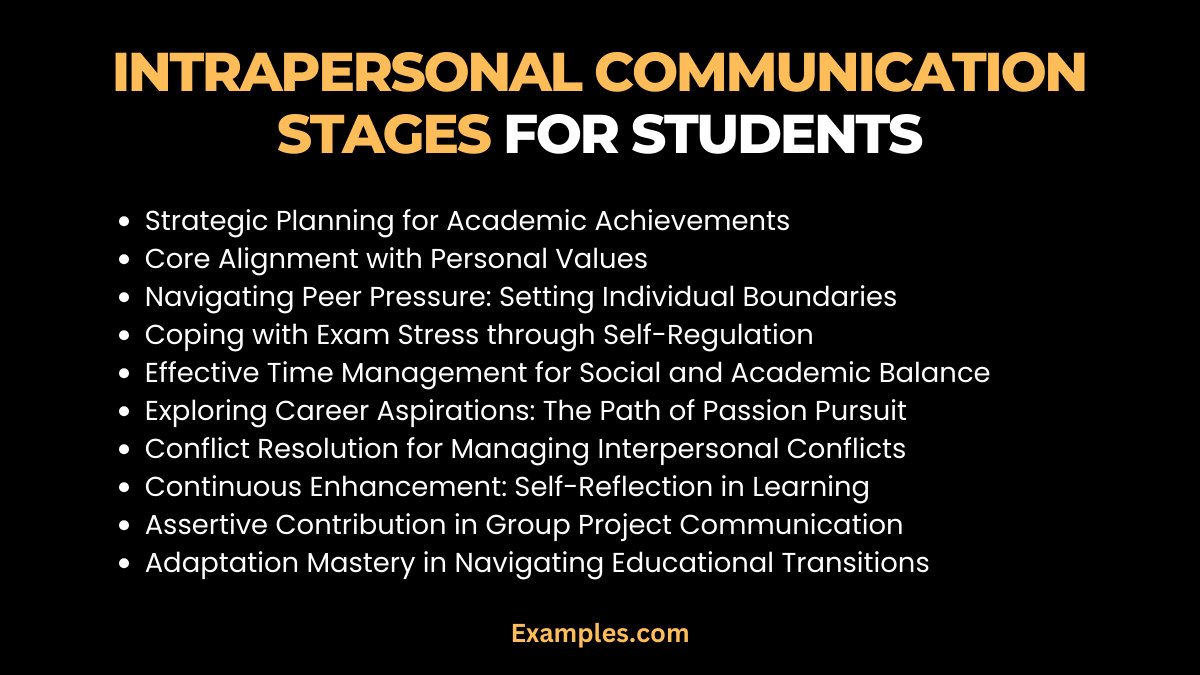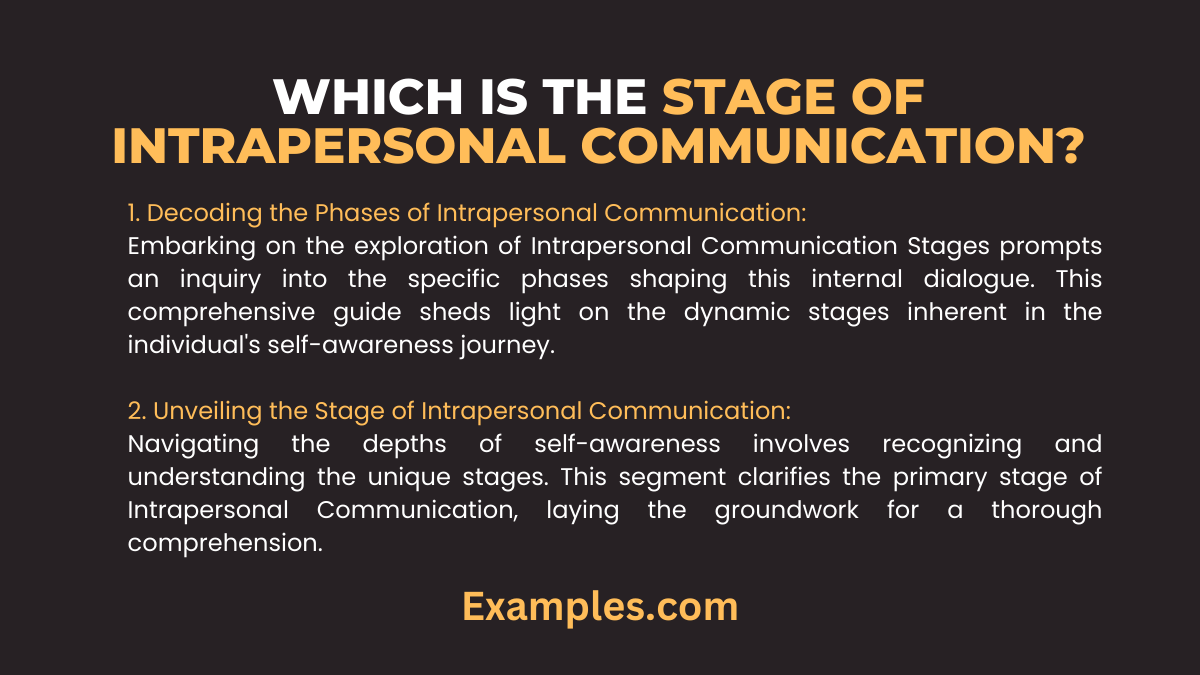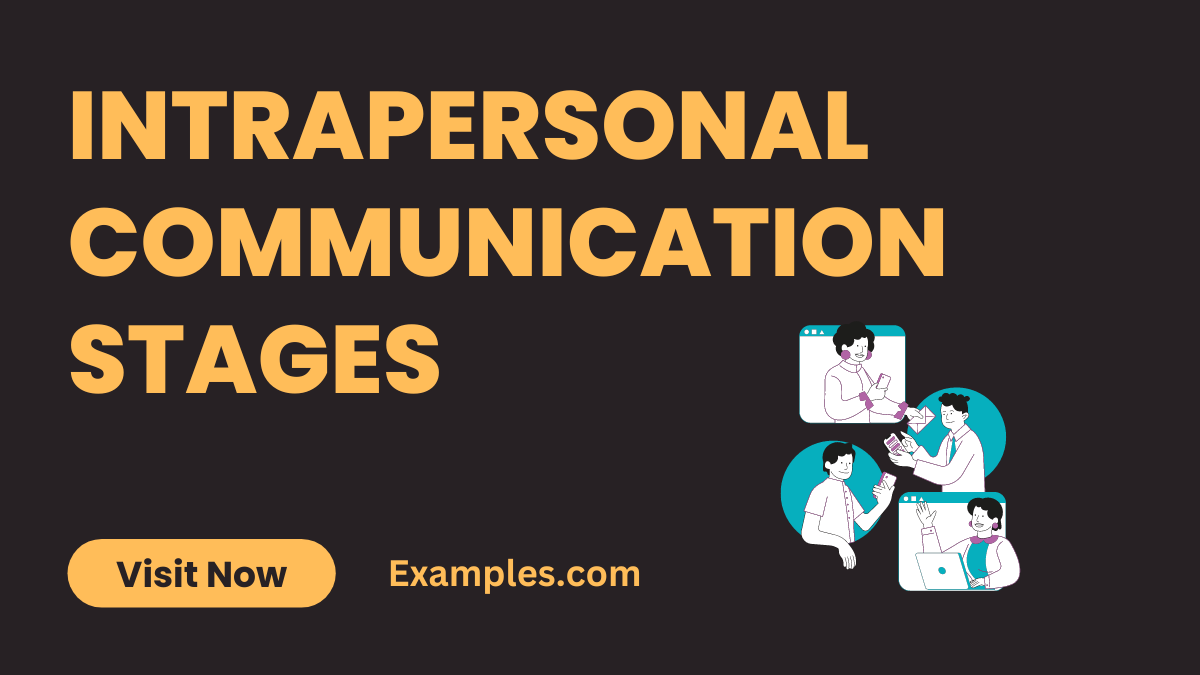10 Intrapersonal Communication Stages Examples
Embark on a transformative journey through the intricacies of Intrapersonal Communication Stages in this comprehensive guide. Understanding these stages is crucial for self-discovery and effective personal communication. Delve into insightful examples that illuminate each stage, providing practical insights for honing your Communication Skills. Navigate the complexities of intrapersonal communication with this enriching guide, tailored to empower your self-awareness journey. Explore the profound impact of Communication Examples in navigating these stages for enhanced interpersonal connections and personal growth.
What is Intrapersonal Communication Stages?

Intrapersonal Communication Stages refer to the distinct phases individuals undergo in their internal dialogue and self-reflection processes. In simple terms, it encompasses the various steps one takes in understanding and communicating with oneself. These stages involve self-awareness, reflection, and the interpretation of personal thoughts and emotions. Exploring Intrapersonal Communication Stages provides valuable insights into one’s inner world, fostering personal growth and effective self-expression.
Intrapersonal Communication Stages Examples for Students

Embark on a journey through Intrapersonal Communication Stages tailored for students. This guide illuminates self-discovery, enhancing interpersonal skills crucial for academic and personal success
1. Setting Academic Goals:
- Strategic Planning: Envision academic achievements to fuel motivation.
2. Reflecting on Personal Values:
- Core Alignment: Align decisions with personal beliefs and principles.
3. Navigating Peer Pressure:
- Individual Boundaries: Make choices resonating with personal values.
4. Coping with Exam Stress:
- Self-Regulation: Utilize techniques to manage stress and optimize performance.
5. Balancing Social and Academic Life:
- Effective Time Management: Juggle social engagements and academic commitments.
6. Exploring Career Aspirations:
- Passion Pursuit: Delve into interests to shape future career choices.
7. Managing Interpersonal Conflicts:
- Conflict Resolution: Maintain healthy relationships in the academic community.
8. Self-Reflection in Learning:
- Continuous Enhancement: Reflect on academic progress and challenges.
9. Effective Communication in Group Projects:
- Assertive Contribution: Contribute ideas while respecting diverse perspectives.
10. Navigating Educational Transitions: – Adaptation Mastery: Adapt smoothly to new academic environments by understanding personal strengths and weaknesses.
Types of Intrapersonal Communication Stages
- Self-Awareness: Navigate the realm of self-awareness by acknowledging personal emotions and thoughts in challenging situations. This crucial stage lays the foundation for understanding oneself better and fostering emotional intelligence.
- Example: Recognizing personal emotions and thoughts in response to a challenging situation.
- Introspection: Embark on a journey of introspection, delving into past experiences to analyze their impact on current feelings. This reflective process promotes self-discovery and emotional resilience
- Example: Reflecting on past experiences and analyzing their impact on current feelings.
- Perception of Emotions: Explore the spectrum of emotions in various situations, honing the skill of identifying and understanding one’s emotional landscape. This heightened awareness enriches emotional intelligence and interpersonal connections.
- Example: Identifying and understanding the range of emotions experienced in different situations.
- Intrapersonal Conflict Resolution: Engage in the process of resolving inner conflicts by critically evaluating conflicting thoughts and emotions. This skill enhances emotional well-being and promotes harmony within oneself.
- Example: Resolving inner conflicts by evaluating conflicting thoughts and emotions.
- Self-Regulation: Master the art of self-regulation, managing stress through coping mechanisms and positive self-talk. This empowers individuals to navigate challenges with resilience and maintain emotional balance.
- Example: Managing stress by employing coping mechanisms and positive self-talk.
- Goal Setting: Set personal and professional goals through self-reflection and aspirations. Goal-setting provides direction, motivation, and a sense of purpose in the journey of personal development.
- Example: Establishing personal and professional goals based on self-reflection and aspirations.
- Decision-Making: In the decision-making stage, weigh pros and cons internally before significant life choices. This thoughtful process enhances decision quality, aligning actions with personal values and aspirations.
- Example: Weighing pros and cons internally before making a significant life decision.
- Values Clarification: Navigate decision-making by identifying and prioritizing personal values. Values clarification acts as a compass, guiding individuals towards choices aligned with their core principles
- Example: Identifying and prioritizing personal values to guide decision-making.
- Personal Growth and Development: Actively seek opportunities for learning and self-improvement in the pursuit of personal growth and development. Embrace challenges as avenues for continuous evolution and refinement.
- Example: Actively seeking opportunities for learning and self-improvement.
- Effective Self-Expression: Master the art of effective self-expression by communicating personal thoughts and feelings clearly and assertively. This skill fosters meaningful connections and promotes authenticity in interpersonal relationships.
- Example: Communicating personal thoughts and feelings clearly and assertively.
Which is the Stage of Intrapersonal Communication?

Decoding the Phases of Intrapersonal Communication:
Embarking on the exploration of Intrapersonal Communication Stages prompts an inquiry into the specific phases shaping this internal dialogue. This comprehensive guide sheds light on the dynamic stages inherent in the individual’s self-awareness journey.
Unveiling the Stage of Intrapersonal Communication:
Navigating the depths of self-awareness involves recognizing and understanding the unique stages. This segment clarifies the primary stage of Intrapersonal Communication, laying the groundwork for a thorough comprehension.
In navigating the intricacies of Intrapersonal Communication Stages, this guide serves as a beacon for self-discovery and enhanced interpersonal skills. Through comprehensive examples and insights, individuals can unravel the layers of their internal dialogue, fostering personal growth. This complete guide illuminates the path to effective self-expression and a deeper understanding of the nuanced stages that shape our internal communication.
10 Intrapersonal Communication Stages Examples

Embark on a transformative journey through the intricacies of Intrapersonal Communication Stages in this comprehensive guide. Understanding these stages is crucial for self-discovery and effective personal communication. Delve into insightful examples that illuminate each stage, providing practical insights for honing your Communication Skills. Navigate the complexities of intrapersonal communication with this enriching guide, tailored to empower your self-awareness journey. Explore the profound impact of Communication Examples in navigating these stages for enhanced interpersonal connections and personal growth.
What is Intrapersonal Communication Stages?

Intrapersonal Communication Stages refer to the distinct phases individuals undergo in their internal dialogue and self-reflection processes. In simple terms, it encompasses the various steps one takes in understanding and communicating with oneself. These stages involve self-awareness, reflection, and the interpretation of personal thoughts and emotions. Exploring Intrapersonal Communication Stages provides valuable insights into one’s inner world, fostering personal growth and effective self-expression.
Intrapersonal Communication Stages Examples for Students

Embark on a journey through Intrapersonal Communication Stages tailored for students. This guide illuminates self-discovery, enhancing interpersonal skills crucial for academic and personal success
1. Setting Academic Goals:
Strategic Planning: Envision academic achievements to fuel motivation.
2. Reflecting on Personal Values:
Core Alignment: Align decisions with personal beliefs and principles.
3. Navigating Peer Pressure:
Individual Boundaries: Make choices resonating with personal values.
4. Coping with Exam Stress:
Self-Regulation: Utilize techniques to manage stress and optimize performance.
5. Balancing Social and Academic Life:
Effective Time Management: Juggle social engagements and academic commitments.
6. Exploring Career Aspirations:
Passion Pursuit: Delve into interests to shape future career choices.
7. Managing Interpersonal Conflicts:
Conflict Resolution: Maintain healthy relationships in the academic community.
8. Self-Reflection in Learning:
Continuous Enhancement: Reflect on academic progress and challenges.
9. Effective Communication in Group Projects:
Assertive Contribution: Contribute ideas while respecting diverse perspectives.
10. Navigating Educational Transitions: – Adaptation Mastery: Adapt smoothly to new academic environments by understanding personal strengths and weaknesses.
Types of Intrapersonal Communication Stages
Self-Awareness: Navigate the realm of self-awareness by acknowledging personal emotions and thoughts in challenging situations. This crucial stage lays the foundation for understanding oneself better and fostering emotional intelligence.
Example: Recognizing personal emotions and thoughts in response to a challenging situation.
Introspection: Embark on a journey of introspection, delving into past experiences to analyze their impact on current feelings. This reflective process promotes self-discovery and emotional resilience
Example: Reflecting on past experiences and analyzing their impact on current feelings.
Perception of Emotions: Explore the spectrum of emotions in various situations, honing the skill of identifying and understanding one’s emotional landscape. This heightened awareness enriches emotional intelligence and interpersonal connections.
Example: Identifying and understanding the range of emotions experienced in different situations.
Intrapersonal Conflict Resolution: Engage in the process of resolving inner conflicts by critically evaluating conflicting thoughts and emotions. This skill enhances emotional well-being and promotes harmony within oneself.
Example: Resolving inner conflicts by evaluating conflicting thoughts and emotions.
Self-Regulation: Master the art of self-regulation, managing stress through coping mechanisms and positive self-talk. This empowers individuals to navigate challenges with resilience and maintain emotional balance.
Example: Managing stress by employing coping mechanisms and positive self-talk.
Goal Setting: Set personal and professional goals through self-reflection and aspirations. Goal-setting provides direction, motivation, and a sense of purpose in the journey of personal development.
Example: Establishing personal and professional goals based on self-reflection and aspirations.
Decision-Making: In the decision-making stage, weigh pros and cons internally before significant life choices. This thoughtful process enhances decision quality, aligning actions with personal values and aspirations.
Example: Weighing pros and cons internally before making a significant life decision.
Values Clarification: Navigate decision-making by identifying and prioritizing personal values. Values clarification acts as a compass, guiding individuals towards choices aligned with their core principles
Example: Identifying and prioritizing personal values to guide decision-making.
Personal Growth and Development: Actively seek opportunities for learning and self-improvement in the pursuit of personal growth and development. Embrace challenges as avenues for continuous evolution and refinement.
Example: Actively seeking opportunities for learning and self-improvement.
Effective Self-Expression: Master the art of effective self-expression by communicating personal thoughts and feelings clearly and assertively. This skill fosters meaningful connections and promotes authenticity in interpersonal relationships.
Example: Communicating personal thoughts and feelings clearly and assertively.
Which is the Stage of Intrapersonal Communication?

Decoding the Phases of Intrapersonal Communication:
Embarking on the exploration of Intrapersonal Communication Stages prompts an inquiry into the specific phases shaping this internal dialogue. This comprehensive guide sheds light on the dynamic stages inherent in the individual’s self-awareness journey.
Unveiling the Stage of Intrapersonal Communication:
Navigating the depths of self-awareness involves recognizing and understanding the unique stages. This segment clarifies the primary stage of Intrapersonal Communication, laying the groundwork for a thorough comprehension.
In navigating the intricacies of Intrapersonal Communication Stages, this guide serves as a beacon for self-discovery and enhanced interpersonal skills. Through comprehensive examples and insights, individuals can unravel the layers of their internal dialogue, fostering personal growth. This complete guide illuminates the path to effective self-expression and a deeper understanding of the nuanced stages that shape our internal communication.


